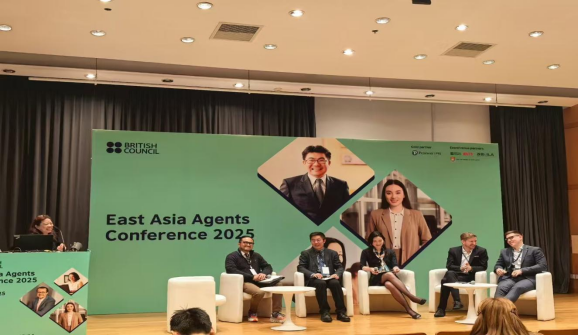East Asia Agent Conference organized by the British Council was held in Hong Kong University on 6th March.
Daniel Zheng, Managing Director of HOPE International Education was invited by the organizer to be one of the panelists to attend a session on: The business of student recruitment agencies in East Asia - challenges and opportunities. This session discussed the current trends, challenges and prospects for student recruitment Agents in East Asia in an evolving landscape where the region is no longer the leading sending countries for the UK. Panels discussed the changing market dynamics and shifting demands in key markets such as China, Hong Kong, Malaysia and Singapore and emerging markets like Vietnam and Indonesia including the impact of regulatory landscape, digital transformation, economic and cultural considerations and the changing roles of student recruitment agents.

The followings are Daniel’s brief reply to the panel questions:
Markets
1. Will the downward shift in some key markets persist?
Up to around 2015-16, enrolment of students in the UK from key markets were on a continual rise. Since then, while recruitment to the UK from East Asia as a whole has still managed to grow for the most part, with China cushioning declines elsewhere, recruitment from key markets including Malaysia, Singapore and Thailand have fallen significantly from their 2015-16 and/or pre-Covid highs. What do you think are the main factors contributing to this change and do you see this as a temporary or more permanent shift?
Daniel:
1. The decline in China market was not obvious before Covid-19, even, 2018-2020 saw some increase as a whole (UG+PG), probably because the demand from international school and less competitive from other countries. The economy in China was still quite strong and families were less price sensitive.
2. Covid-19 was really a turning point which weakened some advantage of studying in the UK:
• Safety and long distance to travel
• Economic downward vs Tuition fee increase
• Difficulty on job market - value for money/cost effectiveness of big investment
• Chinese students’ pursuit of top-ranking (QS top 100) universities.
• Perception of UK education - some low quality programmes/students
• Competitors thrive to meet the market demand (diversified destinations): Singapore, Malaysia, HK, Australia, and domestic joint programmes (4+0,3+1, 2+2)
• Government policy to regulate international school market and in favour of state school
• will lower the UG number in the coming years; lower birth rate means shrinking market
Some are temporary, but some maybe more long term, universities and agent need a joint
effort to change it.
Recruitment Trends
2. Are key markets still worth it?
Are these key markets, those that are experiencing declines in student enrolment still worth pursuing and investing in? Amid limited resources, are they worth being put aside for the sake of emerging markets like Vietnam and Indonesia? Do you think emerging markets could reach the scale of these key markets over the next 10 years? What can the UK do to help these key (declining) markets bounce back? How do recruitment trends differ across East Asia (e.g., China vs. Southeast Asia)? What are the key factors driving these changes and trends in student recruitment?
Daniel:
1. For China market, I don’t think overseas universities can simple neglect it due to its size. On the contrary, it is a good time to think, recall, change and set up long term and sustainable strategy to recover in the market. Long term strategy can include: more partnership; healthy and long- term relationship with key agents; re-build image and profile on the market; improve service for students’ career development; more scholarship but use it wisely; working with alumni and industry.
2. China market is no longer a simple cash cow if you do not investment.
3. A 4-5 year up and down recruitment circle. No one can be at top all the time, nor at the bottom! Need to be optimistic as well!
Intra-Regional Competitors
3. Is intra-regional mobility a real threat?
Regional study destinations are becoming increasingly attractive to students from East Asia from a cost and value-for-money perspective. Universities within the region are moving up the ranks and many countries within the region – China, South Korea, Hong Kong, Malaysia and Singapore – already are or are pushing to become regional education hubs. Are these countries ‘real competitors?’ What do these study destinations still lack and what can students still gain from a UK education that they would not be able to gain elsewhere?
Daniel:
They are real competitors, including some UK institutions’ Asian campuses.
They lack: authentic English and British culture environment; real challenges for students benefits;
Accessibility of UK Education
4. Is a UK education becoming a luxury good?
If studying in the UK could only be afforded by the middle-class in past generations, elevated prices, stubborn inflation, currency fluctuations, low wage growth and economic slowdowns post-Covid has now made it accessible to only the upper-middle class or perhaps even the ultra-wealthy from this region. These economic challenges do not appear to be abating anytime soon. What steps can be taken to prevent the UK from becoming increasingly out of reach amid fee increases and economic challenges faced by students?
Daniel:
1. More scholarship for top students and proper use of it.
2. More career services support leading to more internship and job opportunities in the UK and back at home.

Attractiveness of the UK
5. Is the UK’s cultural influence declining?
Has the UK been realistic in assessing the cultural perceptions of international students towards the UK as a study destination or has it over-estimated its value and appeal to the current generation of youths (Gen-Z, to be joined soon by Gen-Alpha) and parents (Millenials and Gen-X)? Share some key differences towards international education and how the UK is perceived between Millenials and Gen-X parents and Baby Boomer parents and how these will impact the study abroad decisions of their children? What are the primary motivations for students in East Asia to choose the UK for their higher education?
Daniel:
Cultural influence on students very much depends on UK’s overall education quality, its global status, and institutions’ globalization. High quality courses always come first!
Main motivation: safety, short study time, immigration policy (easy for visa), PSW, English and cultural environment, fame and recognition of top universities
The Agent Business
6. Do agents need an overhaul?
What are the most pressing challenges faced by student recruitment agents in East Asia today? (ie: What are the factors challenging the agent business?) How are agents addressing these challenges? What do you see are the evolving roles of agents in the student application journey? What other skill sets do agents need to grow and sustain their business? How can UK universities and recruitment agents collaborate more effectively to overcome challenges and seize opportunities in the region? Why would students use agents given that information is easily available and application process are fairly straight forward?
Daniel:
Most pressing challenges for agents: 1) frequently changing market demand; 2) frequently changing country and institution policy; 3) changing and more demanding requirement from UK institutions for recruitment number only;
Agent business needs to be diversified. HOPE is now much more than just an agent!
A healthy and sustainable agent-university relation highly required, each agents has its own different strength, and a wise use of each agent’s resource can be a challenge to UK institutions if the communication between the two parties are not systematic and strategic.
7. Can agents be the connector between universities, industry and alumni?
Amid stiff competition, could agents look into providing a more integrated service beyond just helping students with decisions on where and which institutions to apply to, and instead, expand their services into connecting returning students with internship or employment opportunities? Could agents be the connector between universities, industry and alumni and bring about the increased engagement between these sectors that is so lacking currently?
Daniel:
Definitely! Agents can help organize alumni to share their study, living and career experience with potential students; Current students can be as promotion ambassador via online and in person events organized by agents; Agent can assist with local industry visit. Agent can help organize subject related master/demo classes in local international schools! These are all what HOPE has been doing!




